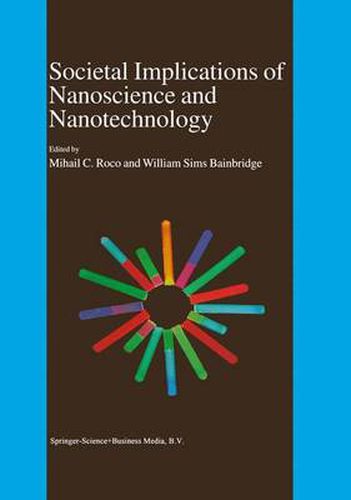Readings Newsletter
Become a Readings Member to make your shopping experience even easier.
Sign in or sign up for free!
You’re not far away from qualifying for FREE standard shipping within Australia
You’ve qualified for FREE standard shipping within Australia
The cart is loading…






This title is printed to order. This book may have been self-published. If so, we cannot guarantee the quality of the content. In the main most books will have gone through the editing process however some may not. We therefore suggest that you be aware of this before ordering this book. If in doubt check either the author or publisher’s details as we are unable to accept any returns unless they are faulty. Please contact us if you have any questions.
Advances in nanoscience and nanotechnology promise to have major impacts on human health, wealth, and peace in the coming decades. Among the expected breakthroughs are orders of magnitude increases in computer efficiency, human organ restoration using engineered tissue, ‘designer’ materials created from directed assembly of atoms and molecules, and the emergence of entirely new phenomena in chemistry and physics. This book includes a collection of essays by leading scientists, engineers, and social scientists reviewing the possible uses of these impending technical developments in various industrial, medical, and national security applications, and the corresponding ethical, legal, social, economic, and educational issues that they raise. The report outlines potential areas for research into societal implications of nanotechnology, as well as some preliminary suggestions for how potential positive impacts of nanotechnology can be maximized, while minimizing any possible negative impacts, real or imagined. This book also provides the beginning of a blueprint for how one should address second-order consequences of the new technology, either positive implications or potential risks. This material was prepared under the auspices of the US National Nanotechnology Initiative (NNI). The issues raised in the book are global in scope, going far beyond the immediate impact of the NNI. They ask the general questions of how history and the human condition are affected by technological progress, and how individuals and institutions can seek to guide that progress in ways most beneficial to mankind in the long run.
$9.00 standard shipping within Australia
FREE standard shipping within Australia for orders over $100.00
Express & International shipping calculated at checkout
This title is printed to order. This book may have been self-published. If so, we cannot guarantee the quality of the content. In the main most books will have gone through the editing process however some may not. We therefore suggest that you be aware of this before ordering this book. If in doubt check either the author or publisher’s details as we are unable to accept any returns unless they are faulty. Please contact us if you have any questions.
Advances in nanoscience and nanotechnology promise to have major impacts on human health, wealth, and peace in the coming decades. Among the expected breakthroughs are orders of magnitude increases in computer efficiency, human organ restoration using engineered tissue, ‘designer’ materials created from directed assembly of atoms and molecules, and the emergence of entirely new phenomena in chemistry and physics. This book includes a collection of essays by leading scientists, engineers, and social scientists reviewing the possible uses of these impending technical developments in various industrial, medical, and national security applications, and the corresponding ethical, legal, social, economic, and educational issues that they raise. The report outlines potential areas for research into societal implications of nanotechnology, as well as some preliminary suggestions for how potential positive impacts of nanotechnology can be maximized, while minimizing any possible negative impacts, real or imagined. This book also provides the beginning of a blueprint for how one should address second-order consequences of the new technology, either positive implications or potential risks. This material was prepared under the auspices of the US National Nanotechnology Initiative (NNI). The issues raised in the book are global in scope, going far beyond the immediate impact of the NNI. They ask the general questions of how history and the human condition are affected by technological progress, and how individuals and institutions can seek to guide that progress in ways most beneficial to mankind in the long run.